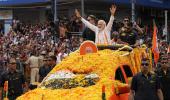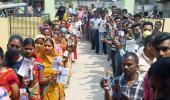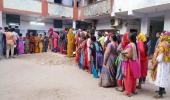Moving ahead with its 'one nation, one election' plan, the government on Wednesday accepted a high-level panel's recommendations for holding simultaneous polls for the Lok Sabha, state assemblies and local bodies in a phased manner after a countrywide consensus-building exercise.

Home Minister Amit Shah hailed the cabinet's decision, saying it will be a giant stride towards landmark electoral reforms in the country.
Various opposition parties, however, said holding simultaneous polls is not practical.
Asserting that several political parties are already on board, the government said even those parties that are opposed to it may now feel pressure from within to change their stand due to the widespread support on the issue from the people of the country.
Announcing the Union Cabinet's approval to the proposal, Information and Broadcasting Minister Ashwini Vaishnaw said an implementation group would be formed to take forward the recommendations of the panel headed by former president Ram Nath Kovind and detailed discussions would be held on various fora across the country over the next few months.
"We will seek to create a consensus over the next few months.... Our government believes in creating a consensus on items which affect democracy and the nation in the long run. This is a subject, a topic that will strengthen our nation...," Vaishnaw said.
Responding to a question on the stand of opposition parties, the minister said, "The opposition might start feeling internal pressure (about 'one nation, one election') as more than 80 per cent of the respondents who responded during the consultation process have given their positive support, especially the youth. They are very much in favour of this."
Asked by reporters when the recommendations could be implemented and whether a bill would be brought in the upcoming winter session of Parliament, Vaishnaw evaded a direct reply but pointed out that Shah has said the government would implement it in its current tenure.
After the discussions are completed, implementation would follow in steps and it would be the government's endeavour to build a consensus over the next few months, he said.
Once the consultation process is over, the law ministry will draft a bill, place it before the cabinet and subsequently, take it to Parliament for simultaneous polls to come into effect, the minister added.
Sources in the government later said a singular bill or a set of bills will be brought before Parliament.
Key National Democratic Alliance constituent Janata Dal-United welcomed the Union cabinet's decision, saying such a measure will rid the country of frequent polls, obviate the drain on public exchequer and result in policy continuity.
JD-U national spokesperson Rajeev Ranjan Prasad said 'one nation, one election' will have long-term consequences and bring the country comprehensive benefits.
Congress president Mallikarjun Kharge said simultaneous elections are not practical and alleged that the ruling BJP comes up with such things to divert attention from real issues when polls approach.
"It is not practical, it will not work. When elections come and they (BJP) do not get any issue to raise, they divert attention from real issues," Kharge told a press conference in New Delhi.
TMC leader Derek O'Brien called it a 'cheap stunt' of the BJP and questioned why the Maharashtra polls were not announced with those in Haryana and Jammu and Kashmir if the government wants simultaneous elections.
AIMIM chief Asaduddin Owaisi said the proposed move will destroy federalism.
Owaisi said multiple elections are not a problem for anyone except Prime Minister Narendra Modi and Shah as they want to campaign in every election.
"Multiple elections aren't a problem for anyone except Modi and Shah. Just because they have a compulsive need to campaign in even municipal and local body elections does not mean that we need simultaneous polls," the member of Parliament from Hyderabad said.
Aam Aadmi Party (AAP) MP Sandeep Pathak wondered how all elections would be held together when the Maharashtra polls could not be held with those in Haryana and Jammu and Kashmir.
In its report submitted to the government in March, just before the general election was announced, the Kovind panel recommended implementing 'one nation, one election' in two phases -- simultaneous polls for the Lok Sabha and state assemblies in the first phase and elections for local bodies like panchayats and municipal bodies within 100 days of the general election in the second phase.
It also recommended a common electoral roll, which would need coordination between the Election Commission of India (ECI) and state election commissions.
At present, the ECI is responsible for the Lok Sabha and Assembly polls, while the local body elections for municipalities and panchayats are managed by the state election commissions.
The Kovind panel has recommended 18 constitutional amendments, most of which will not need ratification by state Assemblies. However, these would require certain Constitution amendment bills that would have to be passed by Parliament.
Some proposed changes regarding the single electoral roll and single voter ID card would need ratification by at least half of the states.
Separately, the Law Commission is also likely to come up soon with its own report on simultaneous polls, of which Prime Minister Modi has been a strong votary.
Sources said the Law Commission is likely to recommend holding simultaneous polls for all three tiers of the government -- the Lok Sabha, state Assemblies and local bodies like municipalities and panchayats -- starting 2029 and a provision for a unity government in cases like a hung house.
The issue of simultaneous polls has been on the BJP's election manifestoes as part of electoral reforms.
The country had simultaneous elections between 1951 and 1967 but thereafter, polls started getting dispersed due to various reasons, including mid-term elections.
Holding all polls simultaneously will require a lot of manoeuvring, including advancing some elections and delaying some others.
While the Lok Sabha polls were held in May-June this year, states like Odisha, Andhra Pradesh, Sikkim and Arunachal Pradesh also went to polls along with the parliamentary election.
The assembly election process for Jammu and Kashmir and Haryana is currently underway, while Maharashtra and Jharkhand are also scheduled to go to polls later this year.
Delhi and Bihar are among the states that are scheduled to go to polls in 2025.
The terms of the current assemblies in Assam, Kerala, Tamil Nadu, West Bengal, and Puducherry will end in 2026, while the terms of the Goa, Gujarat, Manipur, Punjab, Uttar Pradesh and Uttarakhand assemblies will end in 2027.
The terms of the state assemblies in Himachal Pradesh, Meghalaya, Nagaland, Tripura and Telangana will end in 2028.
The terms of the current Lok Sabha and the state assemblies that went to polls together this year will end in 2029.
In 1999, the then Law Commission, in its 170th report, had proposed a single election to the Lok Sabha and all legislative assemblies every five years.
A parliamentary committee, in its 79th report in 2015, had suggested methods for simultaneous elections in two phases.










